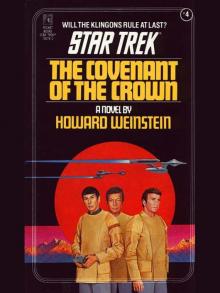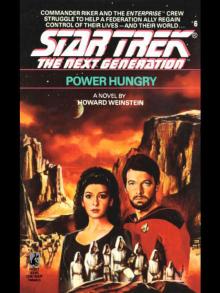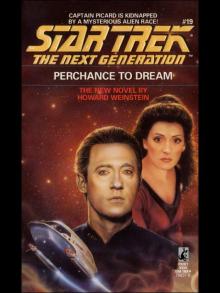- Home
- Howard Weinstein
Perchance to Dream Page 3
Perchance to Dream Read online
Page 3
She shrugged. “Well, he acts like one sometimes.”
“We all do sometimes,” he said pointedly.
“So what does he want to be called, Captain Kenny?”
Wes grinned in spite of himself. “Just Ken, I think.”
“I’ll try to remember that.”
The glint in her eyes made Wesley doubt her sincerity. As they approached the woods fringing the grassy plain which had been the object of most of their geology survey, Wes decided Domarus had been an interesting place for this field work. His satisfied judgment rested partly on the fact that it hadn’t been just an academic exercise. Their performances would of course be evaluated by Data and Troi, and added to their Academy entrance application files. But the information they’d gathered would also enlarge the scanty file on a world which had been visited just once before, eighty years earlier.
The science vessel U.S.S. Jonathan Levy, one of the most active exploration ships of its time, had done that original survey, but hadn’t had the time to log more than a cursory orbital scan, including the geological and biological basics and the conclusion that Domarus Four hosted no sentient life forms, just lots of plants and smaller animals. Wes and his team hadn’t found anything to contradict those reports, but it was fun just the same to do some adult work with minimal supervision.
Though he couldn’t be certain, Wes had a feeling more and more these days that his time aboard the Enterprise was drawing to a close. Was it only three years ago that he’d failed the Starfleet Academy entrance exam? It seemed like a lot longer. As a scared fifteen-year-old, he’d been devastated by a failure. He believed he’d let down his mother, the captain, his friends, the entire ship—until Captain Picard had found him moping in the observation lounge and stunned him with a startling confession: “If it helps you to know this,” Picard had said to him, “I failed my first time . . . and you may not tell anyone!”
Picard had also told him that a person’s successes and failures could only be measured from within, not by anyone else but himself. Not an easy lesson to learn, but Wesley Crusher thought lately that he was finally beginning to understand it.
For reasons Wesley never quite understood, Picard had designated him an acting ensign, giving him access to experiences no Starfleet cadet could possibly have sitting in an earthbound classroom. Then, through a combination of natural talents and several tons of hard work, he’d achieved a field commission, earning his red ensign’s uniform. He was a real starship officer.
After all that, he found it hard to imagine not being a member of the Enterprise crew. Would entering Starfleet Academy feel like a step backward? Maybe. But if he ever wanted to be even half the captain that Picard was, he knew he needed what the Academy had to offer, the theoretical foundation that would give perspective to practical experiences like this away-team mission.
Hiking over a grassy knoll, Wes and Gina entered a forest of towering, slender trees with golden leaves. En route, they found Ken Kolker hunched over like a stocky forest gnome, clipping and collecting some last-minute flora samples. All his classmates knew Ken as the most perpetually serious seventeen-year-old aboard the Enterprise, his moods often as dark as his close-cropped hair. As Wes gestured toward the clearing where the shuttle and their supervising officers waited, Ken fell into step.
But Gina stopped short. “Dammit.”
Wes stopped, too, his hands on his hips and his mouth pinched into an expression of long-suffering impatience. “What did you forget to do now?”
“That stupid seismic testing rig—I forgot to shut it down,” she said, already backing away. “I’ll go back for it—I’ll run—I’ll—”
“I did it,” said Ken, halting her in mid-stride.
Gina blinked at him. “You did what—?”
“On my way back here, I ran down the mission checklist on my tricorder and I noticed the rig wasn’t checked off. So I figured I might as well—”
“Oh, you and your stupid checklists,” Gina said with a roll of her eyes.
“Checklists are important,” Ken huffed.
“There’s more to life than checklists, Kenny,” she said, emphasizing the dimunitive she now knew he disliked. “Do you ever do anything without consulting one of your stupid checklists first?”
“Gina,” Wesley said sharply, “his checklist kept you from getting into trouble.”
“Oh, Wes—that’s not why he retrieved the seismic rig. He probably did it just to make me look bad.”
Out of the corner of his eye, Wes saw how the accusation stung the shorter teen. No one who knew Ken would characterize him as the life of any party, and there was a germ of truth in Gina’s opinion of his lack of spontaneity. But this jab was more than unfair. It was mean. “Gina, that’s not—”
“Forget it, Wesley,” Kenny said, gathering the remnants of his tattered dignity. With no intention of defending himself further, he turned and trudged toward the base camp.
Wes watched him go, then turned to glare down at Gina. “That was totally uncalled for. How do you think it would’ve looked if you suddenly remembered about that test rig after we’d closed the hatch and headed for orbit? You made a mistake—and then you made it worse. We’re a team and team members are supposed to back each other up. That’s all Ken was doing.”
Gina looked away and scuffed the dirt with her toe. “You’re mad at me.”
“Yes, I am—but that’s not the point.”
“What is?”
“What do you think the point is?”
“Teamwork.” She looked up at him. “Are you going to report me?”
He frowned, stretching the moment. She really is cute . . . “Nobody’s perfect,” he finally said, his tone softer.
“Not even you, Wes?” she teased.
“Especially not me.”
“I guess I should apologize to Kenny.”
“That’s up to you.”
Back at the away team’s base camp, they found Ken kneeling in the shadow of the shuttle Onizuka, sorting his last batch of soil and plant samples into appropriate slots in a carrying case. As Gina approached him, Wesley busied himself just out of sight (but within earshot) on the shuttle’s opposite side.
“If you came to make some comment on how compulsive I am,” Ken said without looking up, “save it.”
“Geez, you don’t have to be so touchy. I just came over to apologize.”
Ken’s eyes flicked up in genuine surprise. “You did?”
Gina nodded. “I forgot we’re a team.” She peered over his shoulder, into a sample case awesome in its attention to total order and detail. “But you are the little compulsive, aren’t you?” Delivered with a sly grin, her question was not meant as an insult—and Ken didn’t take it that way.
“It’s one of the few things I’m really good at,” he answered with a slight smile.
She crouched for a closer look. “God, I wish I could be that neat. Then maybe I wouldn’t always be losing or forgetting things.”
“Creative people are allowed to be a little absent-minded.”
Her brows hitched, detecting a compliment. “You think I’m creative?”
“Gina, everybody loves your artwork.”
“What do you think of it?”
Ken shut the sample case and they both straightened up. “I—uh—I’m the wrong person to ask. Some people are tonedeaf—”
“Oh, yeah, and you’re art-impaired?” she scoffed. “Kenny, if you’d just have come into those caves with us—the way those minerals looked under our searchlamps—”
“Me? In a cave? No way—not where ceilings collapse and bury people!” he said with a shudder. Then he nodded skyward. “I’d much rather be up there in a ship, any ship.”
“People die in space, too, y’know.”
“Statistically, it’s much safer to—”
“Oh, nooo—not statistics again,” Gina moaned, covering her eyes with her hands and shaking her head. “What’ve you got against being on a planet?”
&nb
sp; “I was born in space.”
“On a ship?”
Now it was Kenny’s turn to roll his eyes. “Of course on a ship. I was five before I even set foot on a planet.”
“God . . . that’s weird.”
“Not as weird as you think. It just gives you a different perspective on things, that’s all. To me, it’s perfectly normal to be inside a contained, controlled, predictable environment.”
Eavesdropping from the other side of the shuttlecraft, Wesley thought this sounded like a good time to take advantage of the truce between his friends, and he rejoined them. Under his supervision, they set about packing and stowing the last of the base-camp gear.
“This part is not fun,” Gina grunted as she maneuvered a bulky equipment crate toward the squat craft.
“We’re not here to have fun,” Ken said. “We’re gaining experience that’ll up our chances of getting into the Academy.”
“There’s no regulation that says we can’t have fun, too. Hey, Wesley, help me explain—”
“No way. I’m not getting in the middle of another one of your debates,” Wes said with a grin as he scanned the area. “That’s it. We’re done.”
As the three teens climbed through the shuttle’s side hatch, none of them noticed the glittering scintilla flitting in the air above and behind them, at the edge of the clearing.
Commander Data and Counselor Deanna Troi greeted the young away team in the main cabin.
“Ready for departure, sir,” Wesley said.
“Very good, Ensign,” Data said pleasantly. “Mr. Kolker.”
Ken had already moved to a seat in the back when the android’s voice made him turn. “Yes, sir?”
“In view of your expressed interest in helm and navigation studies, I thought you might like to pilot the shuttle into orbit.”
Kenny’s round, somber face lit with excitement and his answer started to tumble out. “Pilot—? Yessir—” He caught himself in mid-sentence and wrestled his excess enthusiasm back under control, an embarrassed flush tinting his cheeks. “I mean, thank you, Commander. I would.”
As he passed Gina on his way to the cockpit, she stifled a giggle. “Wouldn’t want to have fun . . . nuh-uh . . . not cool Kolker.”
Wes and Data followed Kenny into the front compartment, leaving Troi and Gina behind. The counselor looked at her young companion with knowing eyes. “I see you’re still giving Ken a hard time.”
“Ooo—he asks for it.” Then Gina composed her gamine face into an expression of exaggerated dignity. “I know, I know—it’s not mature.”
“But sometimes you can’t help it.”
With a confessional shrug, Gina slid into the form-fit seat. “I bet you were perfect when you were my age.”
A sly smile curled one corner of Deanna’s mouth. “Mmm . . . my mother would dispute that appraisal,” she said dryly.
“So, how did we do on this mission?”
“Gina, you know I can’t tell you what your evaluations will be. Though it is just like you to ask.”
“Scientists have to be inquisitive, right?”
They felt the shuttle rise off the planet surface, shimmying for a couple of unsteady moments, then smoothing out and banking off toward the Domaran sunset.
“Hmm,” said Gina. “Not too bad for a rookie.”
Kenny seemed right at home in the pilot’s seat as he guided the small spacecraft toward standard orbit (though he hoped no one had noticed his slightly wobbly lift-off). Wesley sat beside him, handling sensors and support systems, while Data hovered just behind the two boys, keeping his supervisory presence to an unobtrusive minimum.
“Estimated time of arrival at rendezvous point,” Data asked.
“Thirty-three minutes, sir,” said Wesley.
“Maintaining course and speed,” Ken said.
Wesley gave his scanners a cursory glance, then frowned as he noticed something unusual. “Commander, there’s a ship approaching planet orbit.”
“Is that the Enterprise arriving ahead of schedule?”
“No, sir, not the Enterprise. Unfamiliar configuration, with no identification beacon.”
The android leaned over Wesley’s shoulder for a look. “Hmm. Most curious.” He activated the communications system. “Federation shuttle Onizuka to unidentified vessel. We are on a science survey mission—our presence is nonhostile. Please state the purpose of your approach.”
Awaiting a reply, Data punched up a magnified image of the approaching vessel on the main viewer. Ungainly in design, it was roughly the same size as the Enterprise, and apparently scarred by both battle and wear.
“Looks like she’s seen better days,” Wes murmured.
Data repeated his message—again, without verbal response. The alien vessel held its heading, leaving very little doubt that its convergence with the tiny shuttlecraft was not coincidental.
“Mr. Kolker,” Data said calmly, “evasive maneuver—come to course one-two-five mark nine.”
For a long moment, Ken sat frozen. Wes glanced over and saw the younger boy chewing his lip anxiously. “Kenny—”
At Wesley’s prompt, Ken’s fingers skipped across his panel, entering Data’s instructions flawlessly. Out in space, the unidentified ship altered course, clearly bent on interception.
“We may be nonhostile,” Wes said nervously, “but I’m not so sure about them.”
Without warning, a tractor beam leapt from the silent intruder, crossing the void and snaring the shuttlecraft in a pulsing golden haze. The Onizuka immediately shook in protest, shuddering down to its rivets.
Kenny went pale, tightening his panicky grip on the edges of his control panel.
Wes Crusher swallowed hard, trying to moisten a mouth suddenly gone dry and pasty. “Commander, that tractor beam is too intense. If it keeps up, we’re going to break apart.”
Data peered at the sensor readout. “I concur,” he said, his tone as mild and dispassionate as usual.
Wesley spun around and stared into the android’s wide yellow eyes. For all his intentions of setting an example for the other kids and being the brave young Starfleet officer, Wes was an eighteen-year-old scared to the bone. Fear widened his eyes and spiked into his voice. “Data—what do we do?”
Whatever Data decided, Wes knew it had to be soon—and it better be right.
Chapter Two
IN THIS CASE, the vast repository of knowledge nested within Data’s positronic brain was as good as a dry hole. The tractor beam gripping the shuttlecraft was simply too powerful; escape was impossible, as clearly demonstrated by a brief and futile attempt which succeeded only in straining the engines to the point where the shuttle’s computer automatically throttled them back to prevent critical damage.
Only one option remained. Data opened a communications channel. “Shuttle Onizuka to unidentified vessel. Please reduce the intensity of your tractor beam. If you scan us, you will find that your beam will cause the destruction of this craft within seventy-three seconds.” Then he switched frequencies. “Onizuka to Enterprise. We have been trapped in Domaran orbit by an unidentified starship. We—”
“No good, Data,” said Wesley with a frustrated shake of his head. “Our subspace signal can’t get through this energy field. Should we prepare to launch an emergency message capsule?”
Data’s brows frowned slightly. “It is unlikely that a message capsule could escape the gravitational field of the intruder’s tractor beam.” Then he brightened, without noticing the disheartening effect of his next observation on Wesley and Ken. “Then again, due to its structural design, a message capsule might possibly survive if the shuttlecraft is destroyed, thus leaving an account for the Enterprise when it arrives. An excellent suggestion, Wesley. Encode all relevant information.”
Wes stared at the android for a disbelieving moment. Unfortunately, this wasn’t the proper time to coach Data on the relevance of human feelings in a crisis; but he made a mental note to mention it later—if they got out of this. Instead
, he said, “Yes, sir,” with a weak nod and his fingers skipped across his keypad.
“Commander, look,” Kenny said, pointing to the sensor readout.
Data peered at the display screen, pleased at what he saw. “Ahh. They have reduced their beam intensity by forty percent. We are no longer in imminent danger.”
“Message capsule ready,” Wesley said.
“Launch it, Ensign.”
Wesley keyed the computer and they heard a sound like a sigh from the shuttle’s belly. The tiny capsule popped out of its storage niche and streaked away. But Data had been right; it wasn’t able to break free of the tractor beam. Held within the narrow channel of the beam, it managed to go about two hundred meters—
—where a pinpoint phaser burst from the alien ship blasted it into a puff of dust.
“Dammit,” Wesley growled, thumping his fist against the arm of his seat.
“Most unfortunate,” Data said. “That was our only chance to report our predicament to the Enterprise or any other vessels that might enter this area.”
“We won’t be at the rendezvous,” Ken whispered. “They’ll never find us—”
“Of course they will,” said Wesley.
“Not if we don’t exist anymore,” Ken countered in a jittery voice.
With strong hands, Data swiveled both their seats to face him. “Debating our eventual disposition is not the best use of our—”
“Federation shuttle,” a harsh female voice said from the comm speaker. There was no doubting the authority it carried. “This is the Glin-Kale, flagship of the Teniran Echelon. We are claiming this world. You are guilty of trespass in our territory. You will be held as prisoners—until we decide your fate.”
“I guess it’s a little like a horse with a loose rein,” Beverly Crusher said as her own horse, a well-muscled chestnut mare, ambled along the sun-dappled trail, choosing its own easy pace and pausing now to graze on a stand of tall grass waving in a spring-scented breeze.
“What is?” Picard called as he trotted up on his white Arabian. Picard’s horse stopped alongside hers to sample the grass.
“Fate, Jean-Luc.”

 V06 - Prisoners and Pawns
V06 - Prisoners and Pawns THE COVENANT OF THE CROWN
THE COVENANT OF THE CROWN POWER HUNGRY
POWER HUNGRY PRECHANCE TO DREAM
PRECHANCE TO DREAM Perchance to Dream
Perchance to Dream